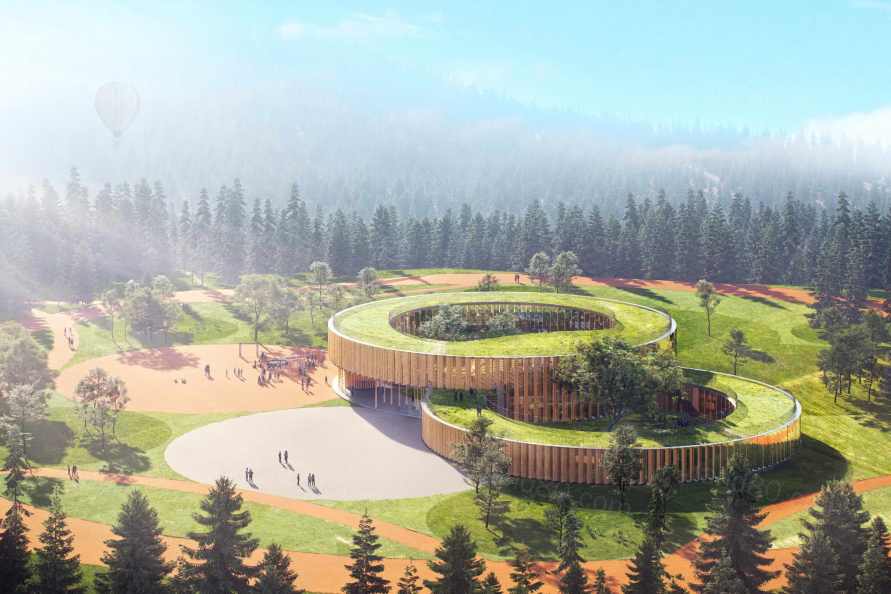COVID大流行病突出了设计建筑物的重要性,在这些建筑物中,与自然的关系得到了加强,室外和室内空间相互之间的联系更加紧密。在这种情况下,教育建筑应该受到首要重视。在世界各地,在这几周里,许多学校在大封锁后刚刚重新开学或即将重新开学。各国政府已经制定了许多协议,以使学生能够返回学校,即使是在设计上不便于实际疏远的建筑中。
The pandemic has highlighted the importance of designing buildings where the relationship with nature is reinforced and where outdoor and indoor spaces are more connected each other. In these context, primary importance should be given to educational buildings. Around the world, in these weeks many schools have just re-opened or are going to re-open soon after the great lockdown. Many protocols have been developed by National Governments in order to make the return to school possible, even in buildings which were not designed to facilitate physical distancing.




未来的学校必须从一个新的角度来设计:而不是仅仅考虑可持续发展的标准,它们必须具备维持整个社会所处的新条件的能力。此外,得益于 "智能工作 "的可能性,COVID后的一个后果是大量人口从大城市迁移到密度较低的地区。这一现象凸显了对那些被遗忘的地区进行再教育的重要性。
The schools of the future will have to be designed under a new point of view: rather then just considering criteria of sustain-ability, they will have to embrace the ability-to-sustain the new condition where the pandemic put the entire society in. Moreover, thanks to the possibility given by the ‘smart working’, one of the post-covid consequeces has been the relocation of mass of people from big cities to less dense areas. This phenomena puts the accent on the importance of requalifying those areas, that have been forgotten so far.
▽剖面图 可持续性发展 Sustainable section

在这种情况下,未来学校的概念模型必须扩大到更大的规模:我们应该开始考虑将几所学校(幼儿园、小学和中学)合并在一起,但仍保持各自的独立性。不仅如此。社区中心,城市广场,咖啡馆和图书馆应该包括在内,并作为整个社区的空间:该建筑是24小时运作的,并成为一个重要的公民参考,并为郊区和农村地区的重新认证的开始和机会。
In these circumstances, the concept model of the school of the future has to be enlarged to a bigger scale: we should start thinking about educational buildings where several schools are combined (kindergarten, primary and secondary school) still maintaining their own independency. Not only this. Community center, an urban plaza, a café and a library should be included and offered as spaces for the entire community: the building is operable 24h and becomes an important civic reference and the begin and opportunity for the requalification of suburbs and rural areas.
▽功能的灵活性 Functions flexibility

考虑到这些方面,建议的设计提供了一个模块化的教育中心,可以包括教育过程的所有阶段。幼儿园、小学和中学。所有所需的空间都被安装在两个环形空间中:体量衔接允许创建两个庭院和一个额外的可用屋顶。教室位于圆形,并与庭院和室外景观相连。每个模块的面积为55平方米,由交叉层压木材制成,相当于一个20/25名学生的理想教室,由一条中央走廊连接。
Considering these aspects, the proposed design provides a modular educational center that can include all the phases of the educational process: Kindergarten, Primary and Secondary schools. All the required spaces are fitted into two rings: the massing articulation allows to create two courtyards and an additional usable roof. The classrooms are located in circle and have connections to the courtyards and the outdoor landscape. Each module, of 55 sqm, is made of cross laminated timber and corresponds to an ideal classroom of 20/25 students connected by a central corridor.
▽项目体量生成与概念 Concept diagrams

该建筑被设计成一个 "树屋",它分布在多个楼层,屋顶也可以使用,室内和室外空间相结合,使教育活动具有高度的灵活性。主要的想法是创造一个悬浮的学校,沉浸在大自然中,就像一棵树屋。在这里,与自然的关系在物理上和视觉上都得到了加强。这要归功于由实木板和玻璃板交替组成的外立面。圆形的外墙可以用不透明的板子阻挡阳光的直射,而通过透明的板子获得漫射的光线和自由的视野。
The building is designed as a ‘tree-house’ and it is distributed through multiple levels, where also roofs are usable and where indoor and outdoor spaces are combined allowing high flexibility for educational activities. The main idea is to create a school that is suspended and immerse in the nature, as a house tree, where the relationship with nature is physically and visibly increased. This is possible thanks to the faceted façade, made by the alternation of solid timber panels and glazing panels. The circular perimeter allows to block the direct sunlight with the opaque panels, and get diffuse light and free view through the transparent ones.
▽项目灵感参考 Reference

未来的学校必须实现能源自给自足。教育建筑采用了一些可持续发展的设备,如雨水收集、自然交叉通风和光伏板、风能设备,都位于较高的屋顶。在这一层,学者们可以接触到所有的可持续发展设备,学校利用这些设备来减少能源消耗。可持续发展成为孩子们教育经验的一部分,他们通过建筑本身第一次接触到这个主题。
The school of the future has to be energy self-sufficient. The educational building adopts several sustainable devices as rain water collections, natural cross ventilation and photovoltaic panels, wind energy devices, all located on the higher roof. At this level, accessible by the scholars, are exhibited all the sustainable devices that the school utilizes in order to reduce the energy consumptions. Sustainability becomes part of the educational experience of the children, who have their first approach to this theme through the building itself.
▽庭院视角 Courtyard view

▽立面概念 Facade concept views

模块化的设计允许未来学校的扩展,不同的项目,不同数量的教室,也可以适应创建不同的功能,如临时医疗中心的紧急情况或临时住宅单元。
The modularity of the design allows for future school extension, different programs, different number of classrooms and also can be adapted to create different functions, such as temporary medical centers for emergencies or temporary residential units.
▽模块化 Modularity

▽功能分析 Program diagram

未来的学校必须是可持续发展的,同时,能够维持新的COVID后时代的需求,它必须是户外空间,具有包容性,向自然开放,由天然材料和低成本的建筑技术制成,如模块化设计。它必须具有高度的灵活性,能够适应不同的功能和项目,并为整个社区提供多种好处,成为城市周边地区重新整合的契机。
The school of the future has to be sustainable and ,in the same time, able to sustain the new post-covid requirements. It has to be outdoor spaces inclusive and open to nature, made of natural materials and low-cost construction techniques, as modular design. It has to be highly flexible and an able to be adapted to different functions and programs, and provide several benefits to the whole community, becoming the incipit for the requalification of peripheral urban areas.

Project: THE TREE-HOUSE SCHOOL
Design: Valentino Gareri
Website: valentinogareri.com
Instagram: v.a.l.e.n.ti.n.o
Parametric modeling: Mirco Bianchini
Frontal & Roof views: Winston Wu
|